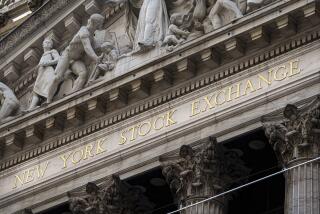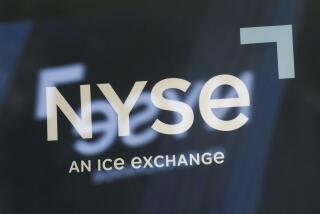Financial markets fear new threat to Eurozone
After weeks of deepening drama over Europe’s debt crisis, global financial markets now fear that the unthinkable may be inevitable: a partial breakup of the continent’s 12-year-old currency union.
Stocks plummeted worldwide Wednesday as the 2-year-old debt debacle took a frightening turn, threatening to engulf Italy and deal a heavy blow to investors’ faith in the Eurozone’s future.
The virtual bankruptcy of Greece, the trigger for the severe bout of market volatility that began in early August, has become a sideshow to Italy’s nightmare: Just as they’d done with Greece, investors are bailing out of Italian government debt, worried that they won’t be repaid in full.
That has sent market interest rates on the country’s bonds soaring in recent days. “It’s a run on Italy,” said Allen Sinai, head of Decision Economics Inc. in New York.
With $2.6 trillion in outstanding sovereign debt, Italy is the world’s third-largest bond market, after the U.S. and Japan. The risk of Italy becoming insolvent dwarfs concerns about Greece, which has a debt load of about $500 billion.
Nervous investors sent stocks reeling across the globe. The Dow Jones industrial average dived 389.24 points, or 3.2%, to 11,780.94. It was the blue-chip index’s biggest drop since Sept. 22.
The market’s losses worsened after reports from Europe suggested that Germany and France were in active discussions about overhauling the European Union, which could lead to some of the union’s weakest members giving up the euro currency.
Though some analysts have warned in recent months that a breakup was becoming unavoidable, investors’ intensified focus on the idea sparked a wave of selling in markets because of the uncertainty it would provoke.
“You’re getting to the point where you’re hearing about separation, and if that happens you’re in no man’s land,” said Wayne Lin, a market strategist for money manager Legg Mason in New York.
But any move to pare the list of the 17 nations that use the euro currency isn’t likely to come soon, analysts say. The immediate threat is that financial-market confidence could continue to crumble unless European leaders provide some kind of debt backstop for Italy.
On Wednesday the market yield on 10-year Italian government bonds soared to 7.25%, the highest since 1997 and up from less than 6% just two weeks ago.
The jump in interest rates shows that “the providers of credit to Italy are getting cold feet,” said Christopher Rupkey, an economist at Bank of Tokyo-Mitsubishi in New York.
The bailout that the European Union negotiated for Greece in late October asks private bondholders to in effect write off 50% of the debt’s value. Rupkey believes that the deal had the unintended consequence of helping to destabilize Italy’s debt market.
Italian bond investors “are afraid of what could happen to them,” he said.
After embattled Prime Minister Silvio Berlusconi agreed Tuesday to step down, Eurozone authorities had hoped that the prospect of a new government would boost confidence. It didn’t work: Some investors continued to dump Italian bonds, driving interest rates higher.
Italy doesn’t face an imminent risk of defaulting on its debt, analysts say. But if investors continue to push up market rates on the country’s bonds the situation could get grim in 2012, when the government must refinance about $400 billion in maturing debt.
European leaders last month announced a plan to expand their $600-billion rescue fund for member states and banks, hoping to stop the continent’s debt crisis from spreading.
The idea was to boost the firepower of the fund, known as the European Financial Stability Facility, to $1.4 trillion by leveraging it. The fund could then eventually guarantee bonds issued by deeply indebted countries, particularly Italy.
But the fund’s expansion remains in limbo, in part because of the reluctance of China and other Asian nations to contribute to it.
That places the onus on the European Central Bank to rush to Italy’s aid, many experts say.
The ECB has been buying Italian bonds in the open market, trying to push interest rates lower. But ECB officials, including new President Mario Draghi, have insisted that they won’t embark on a massive new bond-buying program.
Although the ECB ramped up purchases of Eurozone government bonds last week, Draghi has said the bank’s buying would be “temporary” and “limited in its amount.”
But many on Wall Street believe the ECB now must commit to fully backstopping Italy to halt the rush out of the country’s bonds.
“Why would anyone want to buy Italian debt now, without knowing where the support would come from?” said Decision Economics’ Sinai.
If the market worsens it could wreak more havoc on European banks, whose substantial holdings of Italian debt are devalued as market interest rates surge.
The ECB, however, has made clear that it wants to see Italy and other European countries attack the root of their debt problems by committing to painful austerity programs.
The ECB probably wants to wait for Italy’s parliament to begin discussions next week on a new austerity plan, said Alan Ruskin, a currency strategist at Deutsche Bank Securities in New York.
The risk is that markets won’t wait for the ECB. The euro currency dived 2.1% on Wednesday to $1.354, the lowest since early October. The Italian stock market plunged 3.8% for the day after tumbling 7.8% last week. Most other European markets also slumped Wednesday.
Investors’ broader concern is for the future of the Eurozone itself. Since it was introduced in 1999 the common currency has been adopted by 17 nations. But while united by the currency, the member nations have resisted more steps toward political and economic union.
The result is that some countries, particularly Greece, have followed fiscal policies that have boosted borrowing and depressed growth, leaving them extremely vulnerable when the global financial crisis struck in 2008.
That has created a deeper divide between Germany and France, at the core of the Eurozone, and Greece, Italy and other struggling states.
On Wednesday, news reports from Europe suggested that German Chancellor Angela Merkel and French President Nicolas Sarkozy were discussing moving toward a two-track Europe: more integration of economic policy among a core of stronger states, while weaker states loosen their ties to the core.
That also could mean that some of the weaker countries would drop the euro and go back to their old national currencies. That could help countries such as Greece in the long run because they could devalue their currencies to levels that would make their economies more competitive with the rest of the world.
But dropping the euro also would slash a country’s buying power abroad, deepening the pain of domestic austerity. Debt defaults would probably soar, further ravaging the global financial system.
For investors, this new layer of ambiguity leaves many just wanting to step away from markets.
“Uncertainty is the enemy of the markets, and you’re going to have a prolonged period of uncertainty,” said Legg Mason’s Lin.






